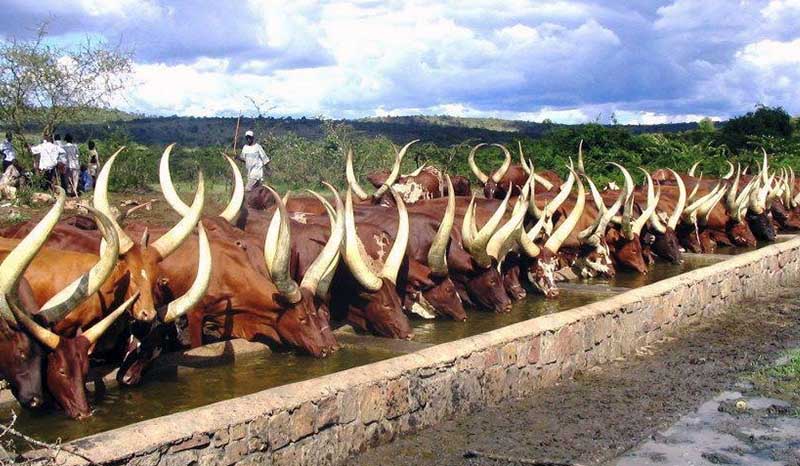The Ankole Cattle, characterised with their Long Horns and beautiful coats are mainly reared in parts of Mbarara Isingiro, Ibanda, Ntugamo, Bushenyi and Kiruhura located in western Uganda. There, they can be seen on the roads and even at the farms.
They are known for their distinctive horns that can reach up to 2.4 m or 8 feet from tip to tip. The horns are used by cows for defense purposes from predators such as lions, leopards, hyenas where they form a tight circle and their horns will face outward toward the predator.
The mature cows have live weight ranging from 410 to 730 kg. The cows mainly eat grass and leaves with supplement of local salt and are grazed in open grazing areas. Ankole cows were traditional reared by herdsmen through moving from one place to another looking for good pastures and water.
The Ankole long-horned cow is better adapted to semi-arid conditions. According to Carlos Ser, the Director General of the International Livestock Research Institute, the reliance on exotic animal breeds poses a high risk because they cannot cope with unpredictable fluctuations in the environment or disease outbreaks when introduced in some developing countries such as Uganda.
Information available on the website of the Pastoral Environmental Network in the horn of Africa also maintains that the Ankole cows can endure seasonal movement and do not require expensive investments in water points and veterinary care — making it the backbone of the pastoral economy.
In the FAO report, scientists say that during the long drought spells for example, some farmers that keep their hardy Ankole breeds were able to walk the long distances to water sources, while those who had traded the Ankole for imported breeds lost their entire herds.
Today, the Ankole Cows are used for: –
- Status – Ankole Cows are and remain a status symbol. They are valued because of the status signifying wealth for the owner. A man’s wealth was seen in the size of his Ankole cattle herd, the size of the horns of his cattle and the coloration of the hides.
- Ankole Cattle are used to pay the Bride’s Price by the groom in negotiated settlements between families
- Ankole Cattle remains one of the best gifts for special occasions.
- The milk has a high fat content, though low on cholesterol. It is used to prepare traditional products such as yogurt and ghee (clarified butter), more recently cheese. This milk is tasty.
- The blood is also used as an ingredient in local cuisine.
- Income for the cattle-keeping Pastoralist as they sell cattle for market.
- Hides from Ankole Cattle are still used as Drum-coverings – clothing, sleeping mats and more.
- Cow-Dung is still used to fertilize – plaster and paint homes.
- Cow Urine is seen by some as having medicinal qualities.
- Ankole Cow Horns are used for decorations and creating jewellery which often is sold to tourists.
- It strengthens social relationships, and its elegance is celebrated in poems and songs.
It is a majestic and elegant animal, able to travel long distances in search of pasture and water. Thanks to its impressive horns (almost six times longer than then European cattle breeds), it was once considered the incarnation of the divine beauty, a yardstick for women and worriers.
…click to watch video …Source of Picture

